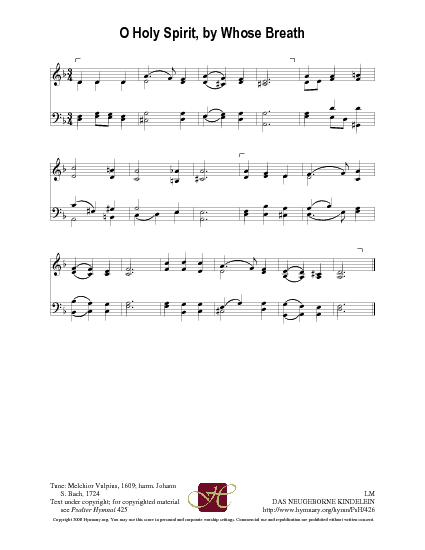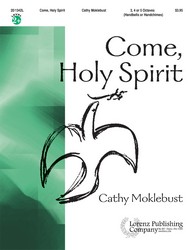- |
User Links
O Holy Spirit, by Whose Breath

O Holy Spirit, by whose breath
Author (attributed to): Rabanus Maurus; Translator: John Webster GrantTune: VENI CREATOR SPIRITUS (Plainsong)
Published in 26 hymnals
Printable scores: PDF, MusicXMLAudio files: MIDI
Author (attributed to): Rabanus Maurus
 Rabanus Maurus (c. 776-856) or Hrabanus Magnentius Maurus, was born of noble parents at Mainz, and educated at Fulda and Tours under Alcuin, who is reputed to have given him the surname, Maurus, after the saint of that name. In 803, he became director of the school at the Benedictine Abbey at Fulda. He was ordained priest in 814, spending the following years in a pilgrimage to Palestine. In 822, he became Abbott at Fulda, retiring in 842. In 847, he became archbishop of Mainz. He died at Winkel on the Rhine, February 4, 856. This distinguished Carolingian poet-theologian wrote extensive biblical commentaries, the Encyclopaedic De Universo, De Institutione Clericorum, and other works which circulated widely during the Middle Ages. Som… Go to person page >
Rabanus Maurus (c. 776-856) or Hrabanus Magnentius Maurus, was born of noble parents at Mainz, and educated at Fulda and Tours under Alcuin, who is reputed to have given him the surname, Maurus, after the saint of that name. In 803, he became director of the school at the Benedictine Abbey at Fulda. He was ordained priest in 814, spending the following years in a pilgrimage to Palestine. In 822, he became Abbott at Fulda, retiring in 842. In 847, he became archbishop of Mainz. He died at Winkel on the Rhine, February 4, 856. This distinguished Carolingian poet-theologian wrote extensive biblical commentaries, the Encyclopaedic De Universo, De Institutione Clericorum, and other works which circulated widely during the Middle Ages. Som… Go to person page >Translator: John Webster Grant
Grant, John Webster. (Truro, Nova Scotia, June 27, 1919- ). United Church. Dalhousie University (Halifax), B.A., 1938, M.A., 1941; Keble College, Oxford, D.Phil., 1948. Served as a Navy chaplain during World War II; acted as editor-in-chief of Ryerson Press (Toronto), 1959-1963; taught church history at Pine Hill Divinity School (Halifax), 1948-1949; Union College (Vancouver), 1949-1957; in South India, 1958-1959; and at Emmanuel College (Toronto), 1963-?. He published many books and articles in his field of specialty, notably The church in the Canadian era (1972). His hymn-writing began with translations and paraphrases, but even they reveal his unusual range of talent and expertise. --Hugh D. McKellar, DNAH Archives Go to person page >Text Information
Related Texts
| First Line: | O Holy Spirit, by whose breath |
| Title: | O Holy Spirit, by Whose Breath |
| Latin Title: | Veni Creator Spiritus |
| Author (attributed to): | Rabanus Maurus |
| Translator: | John Webster Grant |
| Meter: | 8.8.8.8 |
| Source: | Latin hymn, Veni Creator Spiritus, 9th cent. |
| Language: | English |
| Copyright: | Tr. © 1971 John W. Grant |
- Year A, Easter season, Day of Pentecost
Related to 1 Corinthians 12 (NPM)
English
- Australian Hymn Book #329
- Catholic Book of Worship #d100
- Catholic Book of Worship III #412
- Common Praise (1998) #638
- CPWI Hymnal #285
- Gather (3rd ed.) #551
- Gather Comprehensive #461
- Gather Comprehensive, Second Edition #475
- Hymnal: a worship book #291
- Lift Up Your Hearts: psalms, hymns, and spiritual songs #900 10 shown out of 22
French
Notes
Scripture References:
all st. = John 15:26
Like 425, this text is based on the Latin hymn "Veni, Creator Spiritus" (see PHH 425). More a translation than the paraphrase at 425, this text by John W. Grant was written in 1968 and published in the Canadian Anglican and United Hymn Book (1971). Stanley L. Osborne (PHH 395) writes, “The vividness and freshness of its expression combined with its faithfulness to the spirit of the original text marks it as one of the finest translations ever to come out of this century” (If Such Holy Song 246).
Although the ancient text acquires a modern face with the freshness of Grant's translation, the ancient and biblical images are still very much present: we sing of the Spirit as "breath" and "fire" (st. 1); as "giver and Lord of life" (st. 2); as "energy" and giver of gifts (st. 3); as source of light and love (st. 4); and as bringer of peace, fullness, and unity (st. 5). The text concludes with a fine Trinitarian doxology (st. 6).
John Webster Grant (b. Truro, Nova Scotia, Canada, 1919) received his education at Dalhousie University and Pine Hill Divinity Hall in Halifax, Nova Scotia. Ordained in the United Church of Canada in 1943, he became a Rhodes Scholar after World War II and earned a doctoral degree at Oxford. He taught church history at Union College, British Columbia, Vancouver, (1949-1959); served as editor in chief of Ryerson Press (1959-1963); and from 1963-1984 taught church history at Emmanuel College, Victoria University, Toronto. Grant served as a member of the committee that produced The Hymn Book (1971), published by the United Church and the Anglican Church. His writings include Free Churchmanship in England, 1870-1940 (1955), The Canadian Experience of Church Union (1967), The Church in the Canadian Era (1972), and Moon of Wintertime (1984).
Liturgical Use:
See PHH 425; because 426 is a more precise and detailed translation of the original Latin, it is preferred for ordination, baptism, and profession of faith services. Try using an alternate tune such as WINCHESTER NEW (593) for ecumenical services.
--Psalter Hymnal Handbook


 My Starred Hymns
My Starred Hymns





